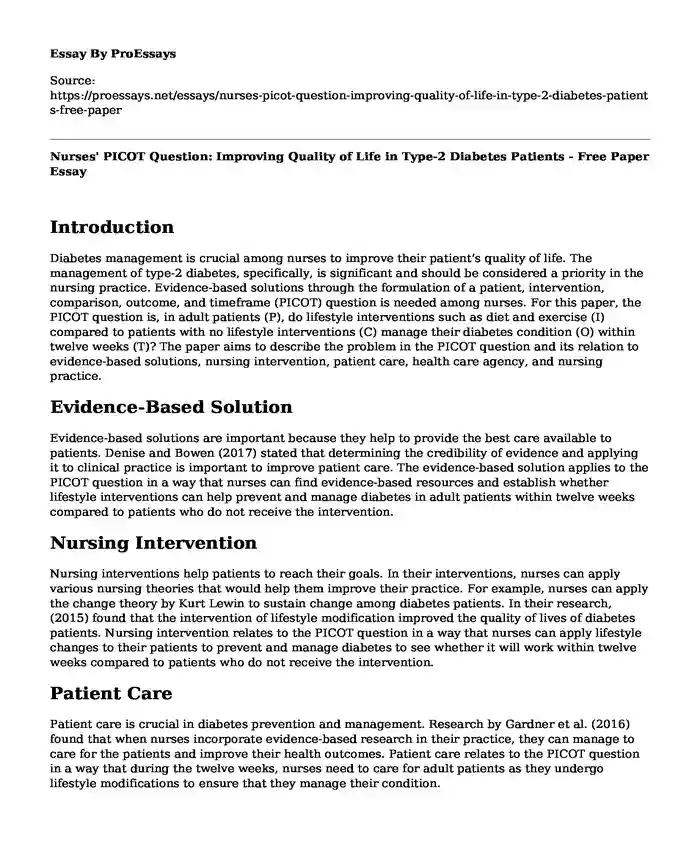Introduction
Diabetes management is crucial among nurses to improve their patient’s quality of life. The management of type-2 diabetes, specifically, is significant and should be considered a priority in the nursing practice. Evidence-based solutions through the formulation of a patient, intervention, comparison, outcome, and timeframe (PICOT) question is needed among nurses. For this paper, the PICOT question is, in adult patients (P), do lifestyle interventions such as diet and exercise (I) compared to patients with no lifestyle interventions (C) manage their diabetes condition (O) within twelve weeks (T)? The paper aims to describe the problem in the PICOT question and its relation to evidence-based solutions, nursing intervention, patient care, health care agency, and nursing practice.
Evidence-Based Solution
Evidence-based solutions are important because they help to provide the best care available to patients. Denise and Bowen (2017) stated that determining the credibility of evidence and applying it to clinical practice is important to improve patient care. The evidence-based solution applies to the PICOT question in a way that nurses can find evidence-based resources and establish whether lifestyle interventions can help prevent and manage diabetes in adult patients within twelve weeks compared to patients who do not receive the intervention.
Nursing Intervention
Nursing interventions help patients to reach their goals. In their interventions, nurses can apply various nursing theories that would help them improve their practice. For example, nurses can apply the change theory by Kurt Lewin to sustain change among diabetes patients. In their research, (2015) found that the intervention of lifestyle modification improved the quality of lives of diabetes patients. Nursing intervention relates to the PICOT question in a way that nurses can apply lifestyle changes to their patients to prevent and manage diabetes to see whether it will work within twelve weeks compared to patients who do not receive the intervention.
Patient Care
Patient care is crucial in diabetes prevention and management. Research by Gardner et al. (2016) found that when nurses incorporate evidence-based research in their practice, they can manage to care for the patients and improve their health outcomes. Patient care relates to the PICOT question in a way that during the twelve weeks, nurses need to care for adult patients as they undergo lifestyle modifications to ensure that they manage their condition.
Health Care Agency. Healthcare agencies play a significant role in ensuring that nurses provide care within their scope of practice and improve the health outcomes of the patients. Healthcare agency such as the Institute for Healthcare Improvement provides measures and changes that are needed to improve the healthcare workforce. Healthcare teams need to establish measures to determine whether a change would result in improvement (Institute for Healthcare Improvement, n.d). Healthcare agencies relate to the PICOT question in a way that nurses can find information on ways to prevent and manage diabetes through lifestyle changes.
Nursing Practice. In their practice, nurses have roles and responsibilities to perform. Nursing practice relates to the PICOT question as within the twelve weeks, nurses will need to be actively involved to provide patients with a diet and exercise plan to improve their condition.
Conclusion
Diabetes prevention and management are vital because it helps to improve the quality of lives of patients. Nurses need to employ evidence-based solutions to help patients to manage their condition. By formulating the PICOT question, nurses can determine whether they can manage the adult patients’ condition within twelve weeks.
References
Bowen, D. M., & Forrest, L. J. (2017). Translating research for evidence-based practice. https://pubs.royle.com/publication/?i=369630&article_id=2666624&view=articleBrowser&ver=html5
Gardner, K., Jr, Kanaskie, M. L., Knehans, A. C., Salisbury, S., Doheny, K. K., & Schirm, V. (2016). Implementing and sustaining evidence-based practice through a nursing journal club. Applied nursing research: ANR, 31, 139–145. doi: 10.1016/j.apnr.2016.02.001
Herman W. H. (2015). The cost-effectiveness of diabetes prevention: Results from the Diabetes Prevention Program and the Diabetes Prevention Program Outcomes Study. Clinical diabetes and endocrinology, 1(9). https://doi.org/10.1186/s40842-015-0009-1
Institute for Healthcare Improvement (n.d). Science of improvement: Testing changes. http://www.ihi.org/resources/Pages/HowtoImprove/ScienceofImprovementTestingChanges.aspx
Cite this page
Nurses' PICOT Question: Improving Quality of Life in Type-2 Diabetes Patients - Free Paper. (2023, Nov 23). Retrieved from https://proessays.net/essays/nurses-picot-question-improving-quality-of-life-in-type-2-diabetes-patients-free-paper
If you are the original author of this essay and no longer wish to have it published on the ProEssays website, please click below to request its removal:
- Strategies for Improving Latino Healthcare in America Video Response
- Adoption of New Technology Systems: Rogers Theory Paper Example
- Hospital Billing System: Reimbursement of Medical Services - Essay Sample
- Essay Example on Obama Care in Texas: Potential Issues and Challenges
- Understanding Euthanasia: The Pros and Cons - Essay Sample
- Job Satisfaction: Achieving Balance in a Multicultural Workplace - Essay Sample
- Essay Example on Emergency Management Plan: Onsite Childcare & Partnerships







